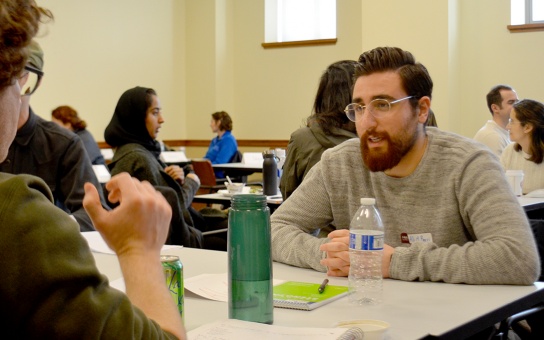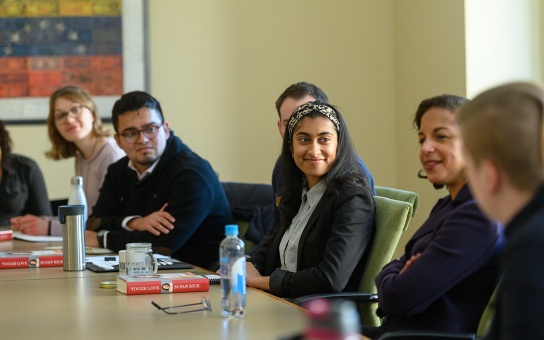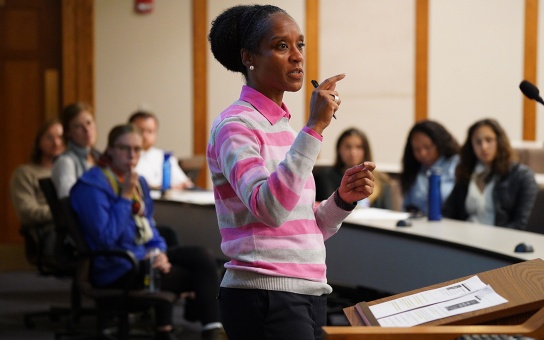
By Rebecca Cohen (MPP ‘09)
There are more than 3 trillion Google search results for “leadership.” Articles about the “7 leadership mistakes you’re probably making” and “Why You Can’t Teach Leadership” and “11 leadership characteristics” abound.
What defines leadership—and how to develop it—is tricky to pin down. A simplified, common understanding in the business world is that leadership encompasses the characteristics or practices for managers, directors, and CEOs that improve corporate success.
The Ford School’s definition of leadership—the behavioral process of having a positive impact on individuals, organizations, and communities to advance the public good—places emphasis on the positive influence that anyone can have.

“Leadership doesn’t come by title. You don’t have to be the head of an organization to have an impact,” said Paula Lantz, a social demographer serving as associate dean for academic affairs.
Over the past few years, the Ford School has been working to integrate leadership development across the master's and bachelor's curricula, throughout the student experience, and in interactions with policy leaders. Our goal is to give all masters students the tools to influence processes, build and lead diverse teams, and confidently manage change.
“Our framework—to equip students to actively lead organizations, lead others, and lead one’s self—is simple,” Lantz explains. “It’s central to the mission of the Ford School. We spent a lot of time really thinking about what we were creating and why we were doing it.”
The school’s new integrated Leadership Initiative, whose development is being co-led by Lantz and Jennifer Niggemeier, director of graduate career services and alumni relations, builds on well-known Ford School strengths such as writing, advocacy, communication, and analysis.
Ford School faculty and staff have carefully developed a new suite of offerings for students to develop leadership competencies through required and elective coursework, observation, assessments, practice, and intentional leadership coaching. Students play a key role by practicing their leadership skills within student organizations, and also by identifying specific speakers and workshops they’d like to see and leadership skills they would like to cultivate.
Those competencies are built into core courses, popular new electives like Leadership in Mission-driven Organizations (PubPol 587), and practice-oriented courses and workshops taught by Towsley Policymakers in Residence.
The Leadership Initiative purposefully unifies skill building with diversity, equity, and inclusion (DEI) efforts. Students have opportunities, for example, to meet with leaders such as Susan Rice, Cecilia Muñoz, and Ford School alumni, who share personal challenges, choices, and areas in which they’ve grown. “It is important for students to hear from leaders who have traveled similar roads or have similar backgrounds, to understand how they navigate challenges, the choices they made in their careers, and sometimes, where they have failed,” said Lantz.

“The DEI lens can help students broaden their perspectives so they can become effective leaders in a multicultural, global society,” said Stephanie Sanders, the diversity, equity, and inclusion lead at the Ford School. “This focus on inclusive leadership helps students develop other skills as well, like empathy, active listening, and respect.”
Niggemeier describes self-awareness as another key component of successful leadership. And so starting in Fall 2020, all graduate students will have the opportunity to take a leadership assessment. The incoming cohorts this fall went through the CliftonStrengths assessment process together, which served as a useful ice-breaker in a remote environment, notes Niggemeier, and helped students both learn more about their own strengths and appreciate differences in others—“a foundational leadership skill.”
Another key component of the leadership initiative is that all MPP students will have access to a professional leadership coach during their summer internship. “Working with a coach,” Niggemeier says, “will encourage students to observe leadership in the workplace, reflect on how they themselves are showing up, and identify areas for growth in real-time.”

This part of the initiative was piloted over the past two years with great success. International Coaching Federation certified coaches met with a handful of students during their summer internships or Riecker Michigan Delegation Fellowship work to focus on leadership development.
One of those coaches was Adam Schmidt (MPP ‘11). “Coaching is about asking the right questions to help people build language about what is possible and challenging themselves to do more,” says Schmidt.
Schmidt knows leadership. He’s a Ford School MPP alum, former U.S. Army officer, a former government consultant, and now a professional coach. “Ford School students have a natural aptitude for analysis, an inclination toward collaboration to solve problems, and a desire to lead,” he said. “Having the emotional intelligence to know your own strengths and weaknesses and being willing to work on them—that can be a distinguishing feature for potential employers.”
Niggemeier can already see the difference that leadership coaching and other programming has made for students. “My hope is that our graduates trust the tools they have and who they are as leaders so they can effectively provide vision, navigate the challenges ahead, and influence positive change,” she said.
The Ford School’s leadership training will be expanded over the next year with help from a new seed gift from the Meijer Foundation.
“Our students want to improve the world,” said Lantz. “Opportunities for leadership development will help them realize their goals. And the world needs them.”
Below, find the full, formatted Fall 2020 edition of State & Hill.
